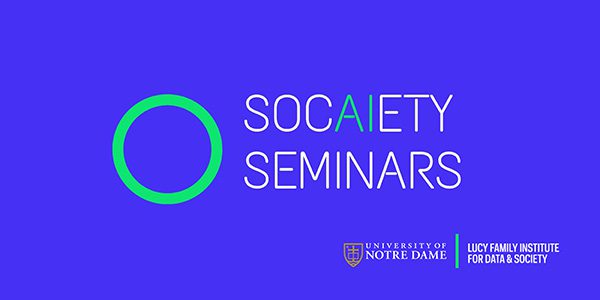The Church, The Healing Community
Wednesday, February 21, 2024 12:00 pm EST
In 2020, in the midst of the pandemic, the Vatican Dicastery for Integral Human Development called upon the Church to live out its call as a healing community. Today, when one in five Americans lives with mental illness, and one in three report serious loneliness, what does it mean for the Church to be a healing community?
Sponsored by the Fiat Program on Faith and Mental Health, this panel considers how the Church can better accompany persons and families living with the experience of mental illness. Drawing from the wisdom of theology, neuroscience, and the practice of pastoral care, our panelists discuss how priests, lay ministers, and all people can strengthen a culture of belonging that both reflects and participates in our sacramental communion within the Body of Christ. Moderated by Beth Hlabse ’11, M.S., LMHCA, program director of the Fiat Program on Faith and Mental Health at the McGrath Institute for Church Life.
Speakers:
Sofia Carozza, M.Phil. ’19, postdoctroformer Marshall Scholar at the University of Cambridge; Louis Damani Jones, M.S.W., behavioral health therapist with SSM Health; Leonard J. DeLorenzo, Ph.D., director of undergraduate studies at the McGrath Institute for Church Life.
For more information visit the McGrath Institute for Church Life.
In the latest installment of Mental Health and the Catholic Church, titled “The Church, The Healing Community”, prominent figures within the faith and mental health communites came together to discuss the intricate relationship between spirituality and mental well-being. Beth Hlabse, director of the Fiat Program on Faith and Mental Health, Louis Damani Jones, a behavioral health therapist with SSM Health, Sofia Carozza, a Marshall Scholar at the University of Cambridge, and Leonard J. DeLorenzo, director of undergraduate studies at the McGrath Institute for Church Life, all offered their insights into how the Church can serve as a catalyst for healing.
A primary focus for the panel was the concept that true healing transcends the individual and becomes a social responsibility. DeLorenzo conveyed that salvation and health are not solely personal endeavors but are deeply rooted in community and charity. He asserted that the Church should be a place where such communal healing is not only encouraged but actively facilitated. This idea set the groundwork for a broader discussion on the communal nature of recovery and support within the context of faith-based communities.
Hlabse further developed this idea by differentiating between treatment—which can often be an isolated and individualized approach—and healing, which she defined as a comprehensive and holistic practice centered around deep connections with others. She urged the Church to adopt practices that command a sense of living in communion, where acts of love and the common good are paramount.
Jones discussed the Church’s role in fostering therapeutic relationships. He underscored the Church’s unique position to establish intimate and restorative interactions that might be essential for someone grappling with mental health concerns. Moreover, Jones suggested that such healing interactions do not always require clinical expertise but are born from creating inviting spaces for authenticity within the parish community.
Adding a neurological perspective to the conversation, Carozza highlighted the scientific backing for the necessity of relationships and community in the journey toward mental health. She cited research that demonstrates how significant social relationships affect neuroplasticity and overall psychological well being. Carozza advocated for a Church that adopts an informed attitude of curiosity and patience, allowing individuals struggling with mental health to experience a sense of belonging and care.
In addressing the power of narratives, DeLorenzo shared the transformative potential of ‘stories of grace,’ where individuals could see God’s presence through their journey, fostering a sense of community and affinity. He stressed that through shared stories, individuals could find comfort in the midst of their suffering.
As the webinar progressed, the conversation touched upon the delicate nature of forgiveness in the healing process, especially concerning mental health. DeLorenzo drew from Christian doctrine to illustrate the potency of forgiveness, while Hlabse spoke to the challenge of self-forgiveness and the consequential need for self-compassion. Carozza brought this point home, contextualizing forgiveness within the scope of mercy and hope, and the need for identifying and nurturing those small certainties that act as stepping stones towards greater self-understanding and reconciliation.
Ultimately, the speakers converged on the belief that healing, at its core, is about understanding each person’s inherent worth as a child of God. They concluded with a hopeful vision for the Church as a community that embraces everyone, acting as a testament to the Gospel’s call to love and support, particularly in the most challenging times of mental health struggles.
In summary, the insights shared during the discussion underscored an evolving approach towards mental health within spiritual communities. Each panelist underlined the Church’s role as both a physical and a spiritual sanctuary that is called to foster holistic healing through communal relationships, narrative-sharing, and the embracing of patience and understanding. As the conversation came to a seamless close, it was evident that the panelists had charted a course for how faith communities could provide more inclusive and understanding support structures for those navigating the complexities of mental health challenges.
The Journey of Forgiveness [08:00]:
Unpacking the complexity of forgiveness, the discussion fosters understanding of it as a nuanced and dynamic process that can facilitate deeper healing. Forgiveness therapy, as dissected in the conversation, involves stages that require commitment and the cultivation of empathy. This not only aids personal recovery but also has the potential to mend and deepen strained interpersonal relationships within the broader community.
Building a Merciful Community [27:00]:
Advocating for mercy within the church community, our panelists point toward a radical ethos that could redefine the communal fabric. By cultivating a culture that is anchored in perceptivity, compassion, and an unwavering commitment to alleviating suffering, communities can become a refuge for those who feel burdened, judged, or shunned, offering them tangible manifestations of grace.
Valuing Neurodiversity in Community Dynamics [01:00:00]:
The acknowledgment of neurodiversity as a vital and enriching aspect of community dynamics calls for an inclusive approach that embraces cognitive and neurological differences. This conversation invites communities to recognize each individual’s unique contributions and understand that the diversity of thought and experience enriches interpersonal dynamics and leads to a more vibrant and resilient community.
Encouraging Self-Compassion Amidst Adversity [01:10:00]:
Self-compassion arises as an essential element of mental well-being. This discussion serves as a clarion call to communities to support practices that encourage individuals to be kind to themselves, particularly in times of mental distress. Providing resources and support systems that emphasize self-care and self-acceptance can play a critical role in the healing journeys of community members.
- Understanding Community and Salvation: “we only become fully human together. This is revealed most brilliantly and fully in the gospel.”
— Leonard J. DeLorenzo [00:18:54 → 00:19:01]
- The Importance of Human Connection: “we’re human beings, not human doings. And so how do we cultivate that shared presence?”
— Beth Hlabse [01:09:27 → 01:09:32]
- Neuroplasticity and Healing: “We can have new neurons that are born and integrated into circuits. We can remodel our connections, and get rid of ones that no longer serve us. And this is how we form new memories and habits and beliefs, which of course aren’t reducible to our biology, but necessarily involve our biology. So, On the level of our biology, change and healing is eminently possible throughout our life.”
— Sofia Carozza [00:14:08 → 00:14:31]
- Stories of Grace: “When we’re talking about grace and God’s action in our lives, we’re talking about ourselves as the object of God’s merciful descent. And when God responds to suffering, to illness, to evil, it’s not a response with an explanation, it’s a response with an action, which is to draw near, to join in. To heal sometimes slowly, but all parts from the bottom up.”
— Leonard J. DeLorenzo [00:38:57 → 00:39:23]
- The Intersection of Treatment and Healing: “Healing would not just involve treatment of symptom, but of the whole person.”
— Beth Hlabse [00:23:51 → 00:24:06]
- The Role of the Church in Fostering Authentic Relationships: “Some people feel like they come to a church and they don’t have that sense of authentic relationship even with the person in the pew next to them. That’s a missed opportunity for healing.”
— Louis Damani Jones [00:27:33 → 00:27:47]
- The Healing Power of Social Connections: “a single supportive relationship with a loving adult can protect them against the stressful effects of traumatic events early in their life.”
— Sofia Carozza [00:14:54 → 00:15:37]
- The Transformative Power of Forgiveness: “Forgiveness is the permission granted by the one who’s been wounded for the one who has wounded to have a new chapter, to not be strictly identified with the harm done.”
— Leonard J. DeLorenzo [00:53:58 → 00:54:11]
- The Healing Power of Social Connections: “The human mind and brain, just like the human soul, is intensely social. We see this in particular in the healing journey. […] being with each other actually helps our brains change and grow more quickly.”
— Sofia Carozza [00:15:02 → 00:15:09] - Recovery Orientation in Mental Health: The view in the past of serious mental illness was rather deterministic and fatalistic.Now, we’re highly encouraged to have a recovery orientation– a hopeful vision, that no matter where this person may be on the spectrum of mental health challenges, they can have hope that there’s opportunity for a better life: being able to cope with symptoms better, being able to live just a life full of meaning and richness.”
— Louis Damani Jones [00:06:06 → 00:06:48]
Related Content
Climate Change and The Limits of Narrative
Join the Kellogg Institute for the introductory session of a workshop refining Kellogg Faculty Fellow Roy Scranton’s draft book project “Ethical Pessimism: Climate Change and...
View EventA Brave New World of AI Governance
Explore the connection between data, geopolitics and governance, regulation, self-regulation while discovering examples of good and bad practices in various sectors, such as...
View EventAlgorethics: potentiality and challenges in the age of AI
Explore the possibilities and challenges in ethical governance of AI through algorethics. Algorethics is a term that has been developed since 2018 to denote the need for a study...
View Event

